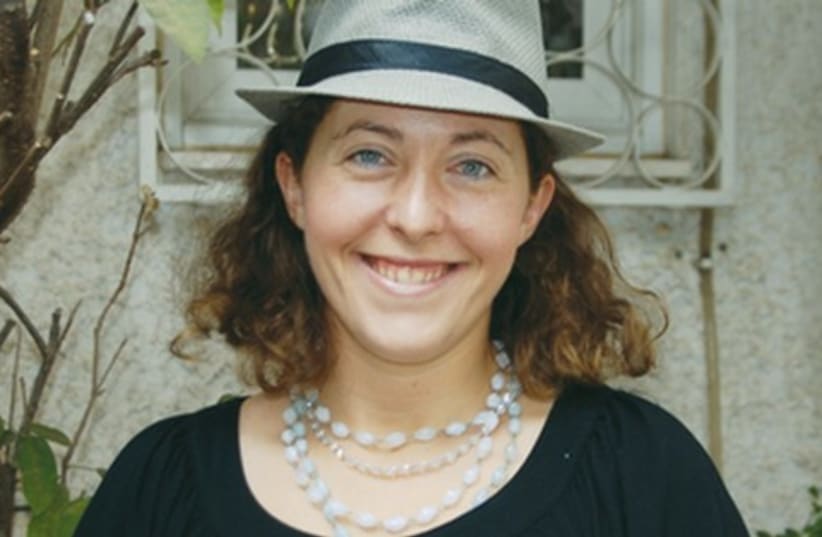The mix of Mahaneh Yehuda shuk and California ideals was an ideal combination for this transplant, who made aliya from the United States seven years ago, has an unusual approach to the perennial problem of weight control. As a holistic health coach, she doesn’t just put her clients on a diet and hope for the best.“I focus on empowering them to feel in control of their health, and I give the tools and motivation to embrace a healthy lifestyle,” says the 30-year-old mother of four, who lives in Talmon with her husband Jonathan.And she is someone who should know about how to lose weight. She says she was overweight from the age of seven.
“I knew more about most mainstream diets than the average adult by the time I was 13,” she says. But nothing helped as she went from overweight to obese in her teens.“I still thought in my heart that I was the problem... I was somehow lacking,” she says.It was a year in Jerusalem in 2001 that put her on the right road to the holy grail of being thin.“I went to study at the [seminary] Darchei Bina and just stopped thinking about dieting,” she says. “Instead I began to focus on who I was as a person. I used to go shopping for vegetables in Mahaneh Yehuda market and cooked for myself. I lost 25 pounds that year after years of trying and failing to lose weight.”She returned to the States to study at the University of California and later Chicago, where she acquired three bachelor’s degrees. The first was in creative writing, the second in Judaic studies – but the most important, as far as her future life was concerned, was in psychology. With this knowledge, she was able to formulate her ideas about the mind/body connection, as well as the realization that food can fuel bad feelings about the self and that positive feelings about oneself play a much more important role than people realize.At the age of 19, while still a student, she became engaged to Jonathan, who worked in real estate. She got a job at the Curves Fitness clubs, where she was trained as an instructor. After their marriage, Jonathan talked about making aliya.“We were about to buy a house,” she says, “and he was up all night worrying. He felt that if we went ahead we would never come to Israel. We didn’t buy the house, and eight months later we were here.”They went straight to Efrat. She intended to teach English, while he would carry on working in real estate.She loved the teaching, but decided that the low pay combined with the large classes and mountains of homework to mark made it less than an ideal occupation for her.She decided to requalify as a certified health coach and took courses through the Institute of Integrated Nutrition, via Internet and other variations on old-fashioned correspondence courses. Within a year, she had gained her qualification.They moved to Talmon, and she began running small weight-loss groups for friends. She realized that one of the most important elements in weight loss was the support system.“Who or what you have supporting you will be a great determinator of how successful you are going to be,” she says.Today, in addition to giving personalized one-onone consultations, she runs three groups. One is for older people with high cholesterol and blood sugar problems. The second is for older mothers who feel a hole in their lives when the children grow up, and who want to rediscover their bodies and achieve something in the next stage of their lives. The third is for new mothers, and she shows them they do not have to give up their own health concerns to be good mothers.She gives lectures on the subject, writes columns on her blog and sees people privately.“I do an in-depth health history, discuss goals and how to achieve them, step by step,” she says, adding that a method such as this can be maintained in the long term.Life in Talmon was strange at first for someone who grew up in Los Angeles.“I was nervous about leaving Efrat, which I loved, but we wanted the children to grow up in a less English- speaking environment,” she says. “It’s not far from Modi’in, but after LA, it certainly feels like the middle of nowhere.”They have found plenty of other English-speaking families, but most of their friends are Israelis.“From the point of view of language, we are much better off here,” she says. “In the schools, there are no English-speakers programs, as [there are] in Efrat, so it gives an indication of the more integrated population. It’s a very warm community, and it’s been good for our Hebrew.”The hardest part for her is not having any family here except one brother, who is a lone soldier. But she finds plenty of support from other working women in a networking program to which she belongs, where she feels she has formed lasting and deep friendships.“Moving here was the best thing that could have happened to us,” she says. “The children grow up with a much deeper connection to Judaism by living here.”Holy Land, holy body
The mix of Mahaneh Yehuda shuk and California ideals was an ideal combination for this transplant.
